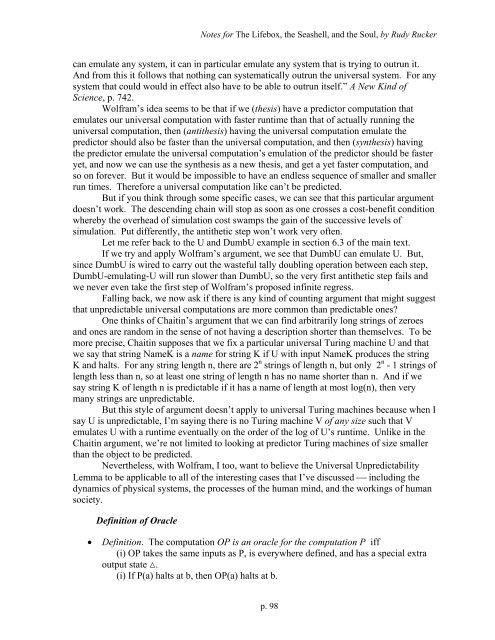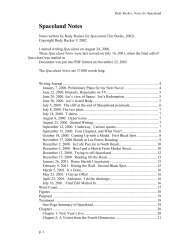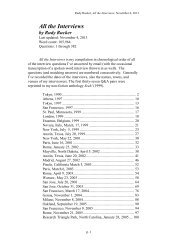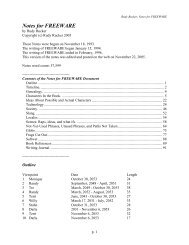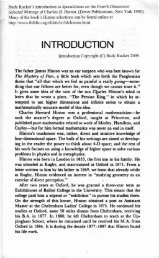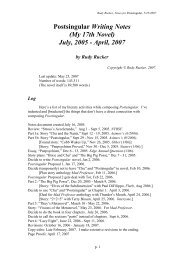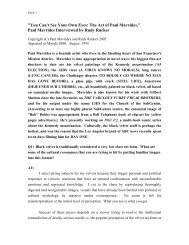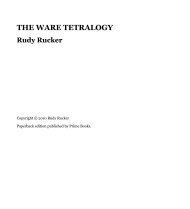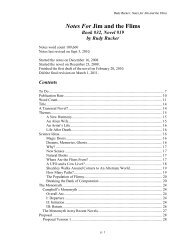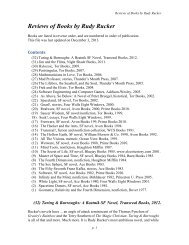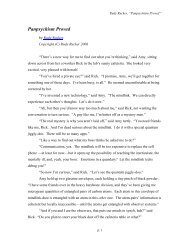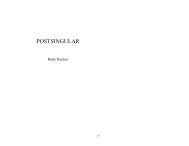Notes for the Lifebox, the Seashell, and the Soul - Rudy Rucker
Notes for the Lifebox, the Seashell, and the Soul - Rudy Rucker
Notes for the Lifebox, the Seashell, and the Soul - Rudy Rucker
Create successful ePaper yourself
Turn your PDF publications into a flip-book with our unique Google optimized e-Paper software.
<strong>Notes</strong> <strong>for</strong> The <strong>Lifebox</strong>, <strong>the</strong> <strong>Seashell</strong>, <strong>and</strong> <strong>the</strong> <strong>Soul</strong>, by <strong>Rudy</strong> <strong>Rucker</strong><br />
can emulate any system, it can in particular emulate any system that is trying to outrun it.<br />
And from this it follows that nothing can systematically outrun <strong>the</strong> universal system. For any<br />
system that could would in effect also have to be able to outrun itself.” A New Kind of<br />
Science, p. 742.<br />
Wolfram’s idea seems to be that if we (<strong>the</strong>sis) have a predictor computation that<br />
emulates our universal computation with faster runtime than that of actually running <strong>the</strong><br />
universal computation, <strong>the</strong>n (anti<strong>the</strong>sis) having <strong>the</strong> universal computation emulate <strong>the</strong><br />
predictor should also be faster than <strong>the</strong> universal computation, <strong>and</strong> <strong>the</strong>n (syn<strong>the</strong>sis) having<br />
<strong>the</strong> predictor emulate <strong>the</strong> universal computation’s emulation of <strong>the</strong> predictor should be faster<br />
yet, <strong>and</strong> now we can use <strong>the</strong> syn<strong>the</strong>sis as a new <strong>the</strong>sis, <strong>and</strong> get a yet faster computation, <strong>and</strong><br />
so on <strong>for</strong>ever. But it would be impossible to have an endless sequence of smaller <strong>and</strong> smaller<br />
run times. There<strong>for</strong>e a universal computation like can’t be predicted.<br />
But if you think through some specific cases, we can see that this particular argument<br />
doesn’t work. The descending chain will stop as soon as one crosses a cost-benefit condition<br />
whereby <strong>the</strong> overhead of simulation cost swamps <strong>the</strong> gain of <strong>the</strong> successive levels of<br />
simulation. Put differently, <strong>the</strong> anti<strong>the</strong>tic step won’t work very often.<br />
Let me refer back to <strong>the</strong> U <strong>and</strong> DumbU example in section 6.3 of <strong>the</strong> main text.<br />
If we try <strong>and</strong> apply Wolfram’s argument, we see that DumbU can emulate U. But,<br />
since DumbU is wired to carry out <strong>the</strong> wasteful tally doubling operation between each step,<br />
DumbU-emulating-U will run slower than DumbU, so <strong>the</strong> very first anti<strong>the</strong>tic step fails <strong>and</strong><br />
we never even take <strong>the</strong> first step of Wolfram’s proposed infinite regress.<br />
Falling back, we now ask if <strong>the</strong>re is any kind of counting argument that might suggest<br />
that unpredictable universal computations are more common than predictable ones?<br />
One thinks of Chaitin’s argument that we can find arbitrarily long strings of zeroes<br />
<strong>and</strong> ones are r<strong>and</strong>om in <strong>the</strong> sense of not having a description shorter than <strong>the</strong>mselves. To be<br />
more precise, Chaitin supposes that we fix a particular universal Turing machine U <strong>and</strong> that<br />
we say that string NameK is a name <strong>for</strong> string K if U with input NameK produces <strong>the</strong> string<br />
K <strong>and</strong> halts. For any string length n, <strong>the</strong>re are 2 n strings of length n, but only 2 n - 1 strings of<br />
length less than n, so at least one string of length n has no name shorter than n. And if we<br />
say string K of length n is predictable if it has a name of length at most log(n), <strong>the</strong>n very<br />
many strings are unpredictable.<br />
But this style of argument doesn’t apply to universal Turing machines because when I<br />
say U is unpredictable, I’m saying <strong>the</strong>re is no Turing machine V of any size such that V<br />
emulates U with a runtime eventually on <strong>the</strong> order of <strong>the</strong> log of U’s runtime. Unlike in <strong>the</strong><br />
Chaitin argument, we’re not limited to looking at predictor Turing machines of size smaller<br />
than <strong>the</strong> object to be predicted.<br />
Never<strong>the</strong>less, with Wolfram, I too, want to believe <strong>the</strong> Universal Unpredictability<br />
Lemma to be applicable to all of <strong>the</strong> interesting cases that I’ve discussed ⎯ including <strong>the</strong><br />
dynamics of physical systems, <strong>the</strong> processes of <strong>the</strong> human mind, <strong>and</strong> <strong>the</strong> workings of human<br />
society.<br />
Definition of Oracle<br />
• Definition. The computation OP is an oracle <strong>for</strong> <strong>the</strong> computation P iff<br />
(i) OP takes <strong>the</strong> same inputs as P, is everywhere defined, <strong>and</strong> has a special extra<br />
output state ó.<br />
(i) If P(a) halts at b, <strong>the</strong>n OP(a) halts at b.<br />
p. 98


